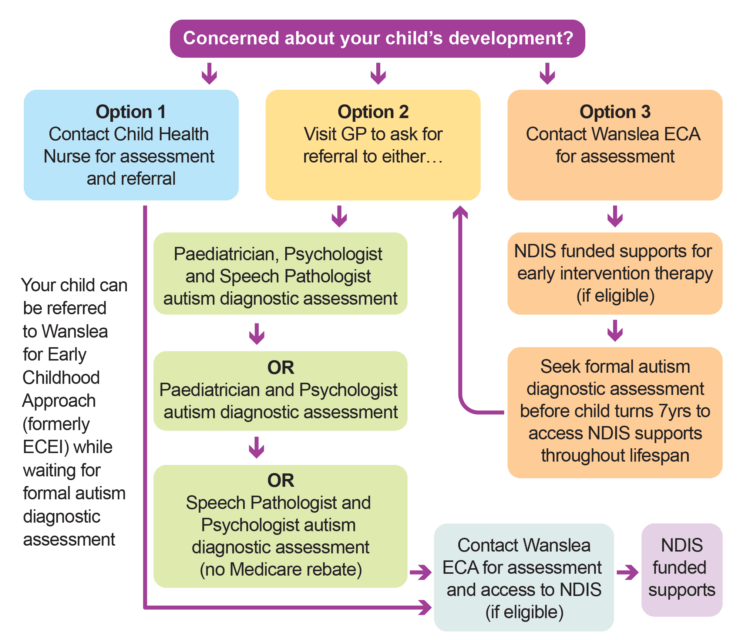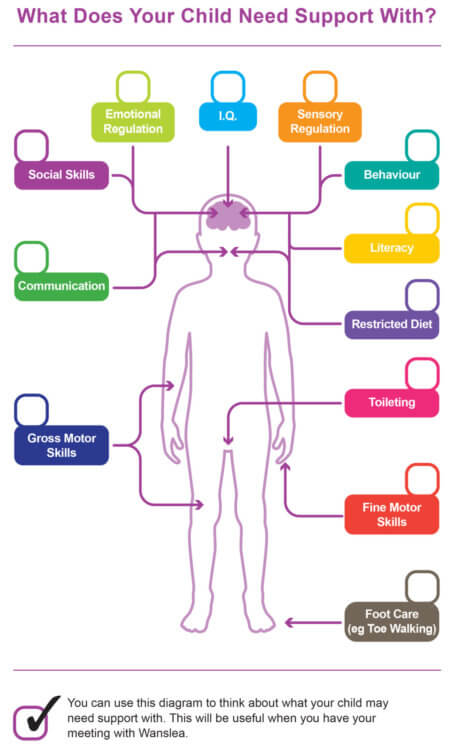
Getting a diagnosis in Western Australia (0-6 years)
In WA, a child aged 0 to 12 years is assessed for autism by two out of three professionals
using the Diagnostic and Statistical Manual of Mental Disorders, version 5
(DSM-V-TR). The three professionals are:
- Paediatrician
- Speech Pathologist
- Registered or Clinical Psychologist
Please note, not all qualified professionals carry out autism diagnostic assessments. Also, the diagnosing professionals and processes are different between children and adults.
The process for diagnosing autism varies between different Australian states and territories. If a person was diagnosed outside WA, they may need to be re-assessed to meet the criteria for support in the WA Education system.
Here’s how it works
If you are a parent worried about your child’s development, here are the different options and steps involved in getting a diagnosis.

The traditional autism diagnostic process in WA starts with an appointment with either your GP or Child Health Nurse to talk about your concerns. Your child needs to go to the appointment with you. The GP or Child Health Nurse can refer your child to see a paediatrician. You can choose which paediatrician, or they can recommend one. The paediatrician’s office will contact you to book an appointment. If you don’t hear from them within two weeks, it’s a good idea to
contact them directly.
The paediatrician will carry out an assessment of your child. If they believe your child needs further assessment for autism, they will refer your child to a speech pathologist and a psychologist for them to do a formal autism diagnostic assessment. These assessments can be done either through the public or private systems.
- Public: diagnostic assessments are free, but the waiting period for children aged 0 to 6 years is around 6 to 12 months. For children over 7yrs old, the waiting period is up to 2 years. Public autism diagnostic assessments are
carried out by the Department of Communities – Disability Services OR the State Child Development Centre (Perth families only). - Private: the waiting period for a private autism diagnostic assessment is usually around 1 to 4 months, and you will need to pay a fee for the assessments. You may be able to claim some small rebates from Medicare or private health insurance. Please contact the speech pathologist and psychologist before the appointments to find out about their fees and any rebates.
The speech pathologist and psychologist work together to carry out their autism assessments and to write a formal diagnostic report. You may then have a follow-up appointment with the paediatrician to confirm the diagnosis, if they haven’t written a letter beforehand stating their opinion that your child meets the criteria for autism.
The diagnostic assessment can be completed by Psychologist and Speech Pathologist (without Paediatrician), but there is no Medicare rebate available this way.
Children with developmental delay aged 0-6yrs can access Early Childhood Early Intervention (ECEI) through the National Disability Insurance Scheme (NDIS). Wanslea is the ECEI provider for WA. To access this, you can:
- Fill out an NDIS Access Request Form and ask your GP, paediatrician, or allied health therapist to fill out the Supporting Evidence Form which can be downloaded from the NDIS website NDIS Access Request Form. Both forms need to be emailed to NAT@ndis.gov.au, or dropped off at your nearest NDIS or Wanslea office. OR
- Contact Wanslea by phoning 1300 969 645 or emailing ndis@wanslea.asn.au.
Children aged 0-6yrs don’t need to have a formal diagnosis to be eligible for ECEI, but there does need to be evidence of developmental delay. Your child will be able to get NDIS funded ECEI therapy services until they turn 7 but will need a formal diagnosis by the age of 6 years for continued access to NDIS supports throughout their lifespan.
You can find out more information about Wanslea here:
Wanslea Early Childhood Approach
Handy Hint – Collecting evidence and information
You will probably be asked similar questions by the GP, paediatrician, therapists, and other services about your child. You will also receive lots of forms, reports, and paperwork. The best way to keep track of it all is to:
Helpful Tips
- Create a file where you can store everything in one place. Take print copies with you to appointments with your
paediatrician, therapists and ECEI. - Write down your concerns about your child. You can also use video to show the health professional your concerns.*
*Remember to keep any notes and videos private – your child will be an adult one day, and the internet is forever. - Collect supporting evidence of your child’s needs from a variety of sources. e.g., letters or reports from day care, school, therapists.
- Store digital backups of important reports and paperwork in the cloud. Dropbox, Google Docs and OneDrive are some options.
- Never assume the health professional you are meeting has all
your information. Take print copies with you, just in case.


